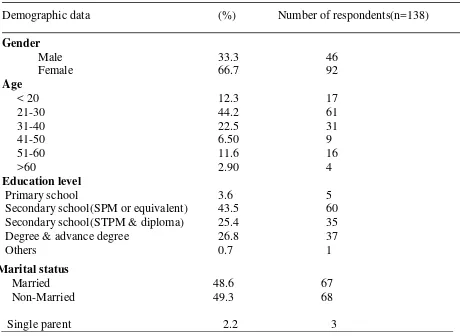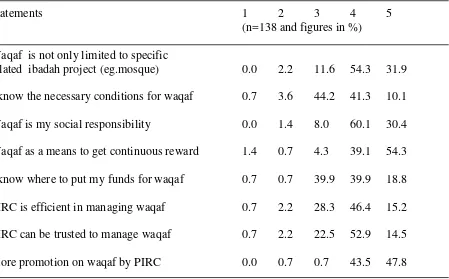307
WAQAF PARTICIPATION AMONG MUSLIMS IN PENANG
1NAILUL MORAD MOHD NOR AND 2MOHD FIRDAUS ZAKARIA
1School of Distance Education, Universiti Sains Malaysia, Penang; 2School of Distance Education, Universiti Sains Malaysia, Penang.
Corresponding author: nmnor@usm.my
ABSTRACT
Waqaf (Islamic endowment) is one of the socio-economic instruments that can be utilized by the community to develop projects or programs by providing essential economics resources. The significant role of waqaf in the Islamic community development in the past has been acknowledged. However, with the passage of time, the roles of waqaf have been limited and forgotten by most Muslims. A purposive random survey was conducted in the state of Penang, Malaysia to determine their participation in the various forms of waqaf such as cash waqaf, mosques, and schools. The findings indicated that sixty three percent of the Muslims respondents had never participated in any waqaf program.To address the issue of lacking of participation in waqaf, this paper aims to seek the reasons behind this lackadaisical and the roles of the Penang Religious Council in promoting waqaf to the Muslims in Penang.
Keywords: Waqaf, cash waqaf, Penang Religious Council
Introduction
Waqaf (Islamic endowment) has been acknowledged to have significant roles in helping many aspects of community needs – from building mosques to schools, hospitals, roads and other infrastructures. However, with the passage of time, the roles of waqaf have been limited and forgotten by most Muslims.
Waqaf (plural –awqaf) is an Arabic word that means hold, confinement or prohibition.
According to the Islamic law or Shari’ah, waqf means holding asset and derives its benefits for Allah’s way (Sayid Sabiq, 1990). Waqf is a recommended act which is associated with the term
of sadaqah and infaq. In Islam, waqaf has special meaning and considered as one of the recommended deeds that has social and economic impact to the community. And in addition waqaf serves as a means for spritual enrichment to the person who makes waqaf.
With new interest in waqf in many Muslim countries including Malaysia, the role of the present waqf system and operation have been revisited and efforts are made to tap the full potential of waqf to suit the current needs and times. Many new waqf programs and projects have been introduced and implemented either by the government, non government organization (NGO) or private corporation.
There are many factors that can contribute or motivate an individual to participate in donation or charity activities. Reinstein as cited in Muda et al (2006) mentioned that worship
factor (ta’abudi) as one of the main motivations that contributes to the compliance of zakat, sadaqa (donation) and other prosocial behaviour (ijtima’i).
308 to many people. The mínimum amount of waqaf is RM5.00.
This paper attempts to determine the participation of the Muslims in the state of Penang, Malaysia in the waqaf programs and the roles of the Penang Islamic Religious Council (PIRC) in promoting waqaf to the Muslims in Penang
Methodology
Respondents for this study were Muslims who were selected through purposive random sampling from five districts in Penang namely, Seberang Perai Utara, Seberang Perai Tengah, Seberang Perai Selatan, Timur Laut and Barat Daya. A structured questionnaire was given to each respondent to answer.
Respondents were asked about personal information and reasons for participating in the waqaf programs. Respondents had to indicate their opinions on waqaf and Penang Islamic respondents who participated in the study, 33.3% were male and 66.7% female respondents. About 66.7% of respondents were in the age group of 21-30 and 31-40. Majority of the respondents had high school education (68.9%). Respondents were almost equally divided into married and non-married groups, 48.6% and 49.3% respectively.
Table 1. Demographic data of the respondents
Demographic data (%) Number of respondents(n=138)
Secondary school(SPM or equivalent) 43.5 60 Secondary school(STPM & diploma) 25.4 35
309 A total of 63.0% of the respondents indicated that they had never participated in any waqaf program and only about 37.0% had particapted in waqaf program. This shows that majority of the respondents were not able to participate in the waqaf programs even though they knew the importance of waqaf for the community and for themselves as an individual who
wants to seek Allah’s pleasure through waqaf.
Table 2. Participation in any waqaf program
Category (%) Number of respondents
NEVER 63.0 87
YES 37.0 51
TOTAL 100.0 138
The various reasons cited by the respondents who had never participated in any waqaf program are illustrated in Table 3 below.
Table 3. Reasons for not participating in any waqaf program
Reasons (%) Number of respondents
No knowledge about waqaf 15.9 22
Do not have excess money for waqaf 31.9 44
Never thought of waqaf 2.2 3
Do not know where to make waqaf 13.0 18
TOTAL 63.0 87
When respondents were asked about the reasons for not participating in any waqaf programs, a high proportion (31.9%) said they do not have excess money for waqaf. This response was not surprising as many Muslims still want to make waqaf that revolves around land and building. Lands or buildings are very costly and need a lot of money. As such only the rich or those with excess cash can afford to participate in any waqaf program.
About 15.9% indicated that they did not participate in any waqaf program due to no
knowledge about waqaf. Reason “Do not know where to make waqaf” was also given by about
13.0% of the respondents. There were respondents who never thought of waqaf in their life (2.2%). Ignorance about waqaf among Muslims is a major stumbling block to get their support for any waqaf programs. Respondents’ ignorance can be in the form of knowledge about waqaf and its importance or about administrative aspect of waqaf by the PIRC such as office location or information on various waqaf programs.
310 respondents) knew about WFS and out of this category only ten respondents did contribute to the WFS.
Some general knowledge about waqaf were also asked to the respondents as shown in Table 4. About 86.2% (Rated 3, 4 and 5) of the respondents agreed that waqaf is not only limited to specific related ibadah program or projects like building mosque, madrasah and graveyard but has more diverse programs to offer to the community. This is a positive view that signals bright future to the development of waqaf in Penang. Waqaf should not be confined to this traditional program/project but should be expanded to other spheres of activities such as funding for research and development, entrepreneurship mentoring, and medical aids.
A big majority (95.6%) of the respondents knew the necessary conditions for waqaf as stipulated in the Islamic jurisprudence (fiqh). Very few just only 4.3% do not know about the necessary conditions for waqaf. About 90.5% agreed that waqaf is their social responsibility.
Statement “Waqaf as a means to get continuous reward” from Allah SWT has been agreed by
93.4% of the respondents. More than half of the respondents know where to channel their funds for waqaf (58.7%). This state of understanding is a good sign that shows people have basic knowledge of waqaf that can be translated into action of doing waqaf in the future.
Table 4.Respondents’ perspectives on waqaf and Penang Islamic Religious Council (PIRC)
Statements 1 2 3 4 5
(n=138 and figures in %)
Waqaf is not only limited to specific
related ibadah project (eg.mosque) 0.0 2.2 11.6 54.3 31.9
I know the necessary conditions for waqaf 0.7 3.6 44.2 41.3 10.1
Waqaf is my social responsibility 0.0 1.4 8.0 60.1 30.4
Waqaf as a means to get continuous reward 1.4 0.7 4.3 39.1 54.3
I know where to put my funds for waqaf 0.7 0.7 39.9 39.9 18.8
PIRC is efficient in managing waqaf 0.7 2.2 28.3 46.4 15.2
PIRC can be trusted to manage waqaf 0.7 2.2 22.5 52.9 14.5
More promotion on waqaf by PIRC 0.0 0.7 0.7 43.5 47.8
1=Strongly Disagree, 2=Disagree, 3=Agree to a certain extent, 4=Agree and 5=Strongly agree
311 of the respondents want more promotion on waqaf by PIRC.
The public want a trustable organization to manage waqaf and PIRC has this advantage. A study by Mohd Nor and Omar (2009) has listed several desirable key characteristics of a waqaf organization which were given by the public, namely transparence, efficient, trustable, innovative and creative. PIRC has some of these characteristics and should not have any difficulties in convincing the public to participate in their waqaf programs. Most Muslims know about waqaf in theory but they need to be encouraged and educated to take the action of involving in the waqaf.
Promotional and waqaf educational programs should be designed more systematically and continuously throughout the year. More efforts are needed to introduce waqf and to bring Muslims to understand the importance of waqf in the non-religious activities such as in providing funds for investments and entrepreneurship endeavors (Hasanah, 2009). The case of waqaf fund scheme (WFS, a form of cash waqaf program) has shown that greater efforts of promotional and waqaf educational programs are needed as the response rate indicated 74.6% or 103 respondents do not know about WFS. WFS can be marketed to the public aggressively as very minimum amount of money is required to maka waqaf.
The young and profesional Muslims who have more disposable income should be targetted to participate in waqaf program beside the older adults or retirees. According to Harrison (1995), people with high income most likely will dónate to non profit organization and income was cited as an important factor because people with higher levels of income have excess resources available for donating Bruggink and Siddiqui (1995, cited in Arnett et al, 2003). The success of Islamic charitable activities has always depended on mass participation of ordinary Muslims who continuously contributed in small amount (Karim, 2007), eventhough the contribution by the wealthy and the rich Muslims are also required.
Conclusions
Most Muslims know about waqaf in general but their participation in any waqaf programs leaves much to be desired. Their notion of waqaf is about mosque and graveyard is still prevalent. Penang Islamic Religious Council (PIRC) has to reexamine their present policies and strategies with regard to educating the public about the importance of waqf in order to mobilize more Muslims to participate and become the waqf contributors. The public has a positive image on PIRC as a trustable waqaf organization and as such can be utilized by PIRC to gain wider participation from Muslims in Penang to become waqaf contributors and movers.
Acknowledgements
The author acknowledges the short term research grant provided by the Universiti Sains Malaysia, that has resulted in this paper.
References
Arnett, Dennis B., Steve D. German and Shelby D. Hunt. 2003. The Identity Salience Model of Relationship Marketing Success: The Case of Nonprofit Marketing. Journal of Marketing Vol. 67, No. 2 (Apr., 2003), pp. 89-105.
Hasanah,U. (2009). Waqf Development in Islamic World (Perkembangan wakaf di dunia Islam) International Workshop and Seminar on Wakaf and Strengthening Community, Medan, Indonesia, 4-10 May 2009.
312 Africa, 17-18 August 2007.
Mohd Nor,N M. & Omar, MZ. 2009. Wakaf (endowment) Friendly Wakif (endower): Opening Access to Enhance Wakaf. International Workshop and Seminar on Wakaf and Strengthening Community, Medan, Indonesia, 4-10 May 2009


